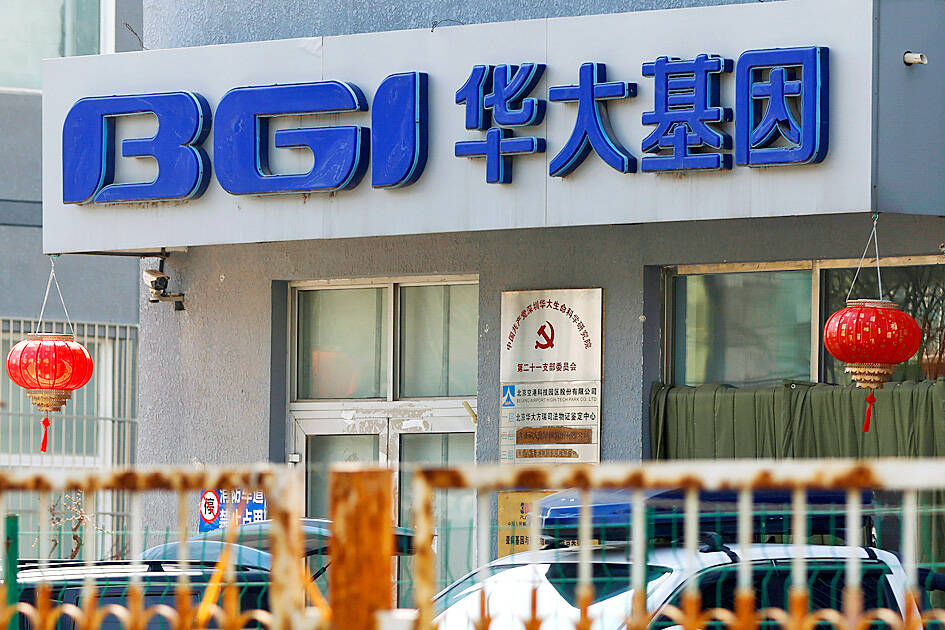Low-cost DNA testing tools from China could present a national security risk, with the potential for genetic data collected in Taiwan to be leaked to China, a cell biologist said yesterday.
The Web site of a local genetic testing company says that it has collaborated with BGI Genomics (華大基因) since 2014, providing its non-invasive fetal trisomy (NIFTY) test in more than 200 obstetrics and gynecology clinics nationwide, including Taipei City Hospital’s Heping Fuyou Branch.
In 2021, Reuters reported that BGI was using the test — one of the most popular in the world — to collect genetic data from millions of women around the globe, and it was sharing that data with the Chinese military for genetic research.

Photo: Reuters
Although BGI said it has never provided data from its NIFTY tests to Chinese authorities for national security or national defense purposes, the NIFTY test has faced scrutiny from regulators in Australia, Canada, Germany and other countries, while the US in March added two subsidiaries of BGI to its trade blacklist.
Academia Sinica Institute of Cellular and Organismic Biology distinguished visiting fellow Wu Jen-leih (吳金洌) said that in addition to BGI, a Beijing-based bioinformatics company, Novogene (諾禾致源), also has laboratories and affiliated agencies in more than a dozen countries, including Taiwan, the US, the UK and Singapore.
The owner of a local genetics company said that the genomic testing and sequencing market in Taiwan can be categorized into four segments, with research and cancer screening accounting for the largest proportion of the market, worth billions of dollars.
Local agents collect specimens from research centers and send most of them to laboratories in China or to the laboratories of subsidiaries of Chinese companies in Southeast Asia for testing, they said.
Some companies have equipment in research centers in Taiwan, which might contain spyware that could send genomic data to China, they said.
Wu said that if genomic data are leaked to China and used for malicious purposes, it could cause a serious national security problem.
He said the government should follow the US in setting up access control systems for genetic data and support the local development of DNA testing tools.
While the US and many European countries developed their own DNA testing and genomic sequencing tools, Taiwan still allows many foreign agents to install equipment made by Chinese companies in hospitals and allows Hong Kong-funded companies to purchase local genetics companies, a genetics company owner said.
The government should support local companies by launching large-scale research projects and banning the use of Chinese equipment, they said.
Department of Medical Affairs Deputy Director-General Liu Yu-ching (劉玉菁) said that the Regulations Governing the Application of Specific Medical Examination Techniques and Medical Devices (特定醫療技術檢查檢驗醫療儀器施行或使用管理辦法) was revised in 2021, requiring hospitals to protect personal data collected through DNA testing.
If laboratories leak genomic data, they could be suspended from running tests, Liu said.
Additional reporting by Wu Liang-yi

CRITICAL MOVE: TSMC’s plan to invest another US$100 billion in US chipmaking would boost Taiwan’s competitive edge in the global market, the premier said The government would ensure that the most advanced chipmaking technology stays in Taiwan while assisting Taiwan Semiconductor Manufacturing Co (TSMC, 台積電) in investing overseas, the Presidential Office said yesterday. The statement follows a joint announcement by the world’s largest contract chipmaker and US President Donald Trump on Monday that TSMC would invest an additional US$100 billion over the next four years to expand its semiconductor manufacturing operations in the US, which would include construction of three new chip fabrication plants, two advanced packaging facilities, and a research and development center. The government knew about the deal in advance and would assist, Presidential

‘DANGEROUS GAME’: Legislative Yuan budget cuts have already become a point of discussion for Democrats and Republicans in Washington, Elbridge Colby said Taiwan’s fall to China “would be a disaster for American interests” and Taipei must raise defense spending to deter Beijing, US President Donald Trump’s pick to lead Pentagon policy, Elbridge Colby, said on Tuesday during his US Senate confirmation hearing. The nominee for US undersecretary of defense for policy told the Armed Services Committee that Washington needs to motivate Taiwan to avoid a conflict with China and that he is “profoundly disturbed” about its perceived reluctance to raise defense spending closer to 10 percent of GDP. Colby, a China hawk who also served in the Pentagon in Trump’s first team,

SEPARATE: The MAC rebutted Beijing’s claim that Taiwan is China’s province, asserting that UN Resolution 2758 neither mentions Taiwan nor grants the PRC authority over it The “status quo” of democratic Taiwan and autocratic China not belonging to each other has long been recognized by the international community, the Mainland Affairs Council (MAC) said yesterday in its rebuttal of Beijing’s claim that Taiwan can only be represented in the UN as “Taiwan, Province of China.” Chinese Minister of Foreign Affairs Wang Yi (王毅) yesterday at a news conference of the third session at the 14th National People’s Congress said that Taiwan can only be referred to as “Taiwan, Province of China” at the UN. Taiwan is an inseparable part of Chinese territory, which is not only history but

INVESTMENT WATCH: The US activity would not affect the firm’s investment in Taiwan, where 11 production lines would likely be completed this year, C.C. Wei said Investments by Taiwan Semiconductor Manufacturing Co (TSMC, 台積電) in the US should not be a cause for concern, but rather seen as the moment that the company and Taiwan stepped into the global spotlight, President William Lai (賴清德) told a news conference at the Presidential Office in Taipei yesterday alongside TSMC chairman and chief executive officer C.C. Wei (魏哲家). Wei and US President Donald Trump in Washington on Monday announced plans to invest US$100 billion in the US to build three advanced foundries, two packaging plants, and a research and development center, after Trump threatened to slap tariffs on chips made